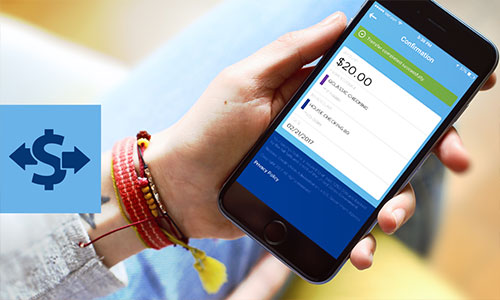Physical cash rarely changes hands in today’s world. Instead, people are much more likely to exchange money electronically for these reasons:
- Electronic transfers are easy, typically only taking a few steps to complete on a computer or smart device.
- They are convenient because you don’t have to go to an ATM or branch to withdraw cash and then deliver it, either in person or by mail, to the other party.
- They don’t require the use of personal checks, which not everyone has today and not all parties accept.
- And when using a trusted source like your own financial institution, electronic transfers keep money in transit safe from thieves, cyber or otherwise.
There are several types of electronic transfers, but today we’re focused on wire transfers.
What are wire transfers?
A wire transfer is an electronic transfer that is processed by a financial institution or nonbank money transfer provider at the request of an account holder or customer to send money to another person or entity’s bank account. Money can be sent via wire transfers within the United States (domestic wires) or to another country (international wires).
Financial institutions send domestic wire transfers through Fedwire®, which is an electronic funds transfer system run by the Federal Reserve. Unless there is a problem with the request, the funds typically reach the other party’s bank account either the same day if the request is submitted by a designated time or the next day if not.
The majority of U.S. financial institutions send international wire transfers through the Society for Worldwide Interbank Financial Telecommunications (SWIFT). Others may use an intermediary domestic bank who then sends the wire transfer on through SWIFT. Although not as immediate as their domestic counterparts, international wire transfers still have a fairly quick turnaround time, typically one to two days.
Who are the parties involved in a wire transfer?
Four active parties participate in a wire transfer:
- The person requesting it
- The requestor’s financial institution or nonbank money transfer provider
- The recipient of the wire transfer
- The recipient’s financial institution or nonbank money transfer provider
When do you use wire transfers?
A wire transfer makes the most sense in the following circumstances:
- The money needs to get to the recipient very quickly and securely.
- The two parties aren’t located in the same area or in the same country.
- You need to safely send a large sum of money to another party.
The most common example of when you might need a wire transfer is when you are closing on a new home and have to provide the closing attorney with your down payment, typically a sizable sum in the tens of thousands of dollars.
Where and how do you request a wire transfer?
The easiest and most convenient way to request a wire transfer is to go to your financial institution, who will ask you to fill out a wire transfer request form, and validate your identity. Some institutions have a physical form, others use an online form and some let you choose from either a physical or online form.
Generally, this is the information you will need to provide on the wire transfer request form:
- Your account number and the number of your local branch
- Your full name and contact information, such as your address and phone number
- The recipient’s full name, address and phone number
- The name of the recipient’s financial institution and its routing number for domestic wires or SWIFT code for international wires
- The recipient’s bank account number
- The reason for the wire transfer
- Any special instructions
After you complete and submit the form to your financial institution, you will typically receive a confirmation either on screen if you’re making the request through online or mobile banking or via email or U.S. mail.
Your financial institution may have a maximum amount limit on wire transfers and most charge a fee for them, anywhere from about $20 or $30 for domestic wires and up to about $45 for international wires.
What happens after you request the wire transfer?
Upon receipt of your wire transfer request, your financial institution will make sure it has everything that is needed before initiating it. Then it sends the payment instructions through either Fedwire for domestic wires or likely SWIFT for international wires to settle the transfer with the recipient’s bank. Once complete, the recipient will see the money in their account.
How to protect yourself from scammers
Typically, you can’t cancel a wire transfer after it’s initiated because the money moves so quickly from your account to that of the recipient. For that reason, you should only send wire transfers to people or entities that you know and trust. Under some extenuating circumstances, your financial institution might agree to investigate a situation for a potential refund, but you should ask about their refund policies before sending any wire.
Also beware of anyone you don’t know who suggests that you use a wire transfer to complete a transaction or otherwise send money to them because scammers love to use this type of electronic transfer to quickly, and often irrevocably, dupe you out of your well-earned money.
How to send money using Quorum’s wire transfer service
Learn how to send money via a Quorum wire transfer here.
Editor’s note: Quorum is not affiliated with any of the companies mentioned in this article and derives no benefit from these businesses for placement in this article.






Comments Section
Please note: Comments are not monitored for member servicing inquiries and will not be published. If you have a question or comment about a Quorum product or account, please visit quorumfcu.org to submit a query with our Member Service Team. Thank you.